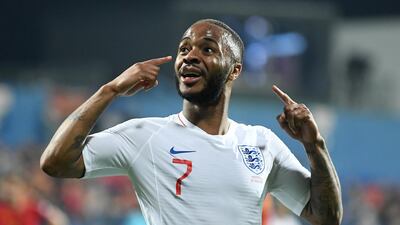Even the least misty-eyed of football fans would concede that the English game has come a long way in the past 30 years. In the three decades I’ve been supporting Wimbledon – from the heights of the Premier League to our more recent battle through the lower divisions – I have only heard racist abuse at a ground once, from a small number of Norwich City fans, in the early 1990s, directed at one of their own black players. There were no repercussions. No media brouhaha, no footage looped on TV news, no earnest promises to root out and ban those responsible.
It was, as they say, a different time. Now there are serious consequences for such behaviour. However, that didn't stop the England team's Euro 2020 qualifier against Montenegro in Podgorica last week being marred by non-stop racist abuse of its black players, including Manchester City's Raheem Sterling, from some home fans.
English football supporters used to be the most notorious in the world. For a while, the nation was synonymous with outbreaks of thuggery on the streets of European cities. Sometimes – but by no means always – this culture included far-right nationalism. However, in 1990 the Taylor Report was published, following an investigation into the previous year’s Hillsborough disaster, in which 96 Liverpool fans were crushed to death during an FA Cup semi-final match against Nottingham Forest. The inquiry found that those lives were lost as a direct result of the “gross negligence” of South Yorkshire Police.
In its wake, English football underwent a root-and-branch transformation. To avoid a similar tragedy occurring again, the report’s recommendations included the introduction of all-seater stadiums. These new facilities demanded a rise in ticket prices, which in turn attracted a new demographic to games. This contributed to a drastic decline of hooliganism and racism on the terraces. But the gentrification of football isn’t the only thing that made the incident I witnessed at Norwich City’s ground so rare in the UK these days. Grassroots anti-racist organisations such as Kick It Out – founded in 1993 – have also played a vital part.
Speaking to the BBC about the Montenegro game, Sterling said: “There should be a real punishment.” European football's governing body, UEFA, subsequently announced that Montenegro would face disciplinary proceedings for “racist behaviour”.
Some said that England manager Gareth Southgate should have taken his team off the pitch in protest. Others said that the football had done the talking, given the 5-1 drubbing England delivered to Montenegro, partly thanks to two assists and a final goal by Sterling. But surely the result is beside the point? What if England had lost? Resilience to racist abuse should not have to be part of any sportsperson's skill-set.
After the game, Montenegro’s manager declined to comment. Southgate, on the other hand, said: “I just think it’s a really sad evening. I’m reflecting on, ‘Should I have done more?’ In the end, I think I tried to protect my players as much as I possibly could. I’m not the authority on the subject. I’m a middle-aged white guy speaking about racism. I’m just finding it a really difficult subject to broach. If people feel I should have done more, then I can only apologise for that."
When you compare Southgate to the men who dominated the English game until recently, the contrast is striking. Ron Atkinson was a former top-flight manager and one of the best-known TV pundits after his retirement. Then, in 2004, he was sacked after a "hot mic" on an international TV broadcast caught him using racial slurs and describing the French star Marcel Desailly as "lazy" and "thick".
People at the higher reaches of the English game may have got better since then, but sometimes it seems that the British media has merely learned how to code its racism more delicately. Sterling has faced years of hounding by the tabloid press as a "footie idiot" or an "England failure". He has also been regularly singled out for being paid the kind of wages many top players now earn.
Responding to these stories, the British writer Musa Okwonga argued in 2018 that the attitude of some of the football establishment wasn’t good enough. “We can’t keep asking footballers merely to ‘answer the racism’ with their performances,” he wrote. “They need more than that – they need more vocal support from those that are not yet speaking up.”
Southgate’s response set a good example, because it did exactly that: he acknowledged his own privilege and his subjective position. He also made it clear that his priority was, and would remain, the welfare of his players.
Despite the many advances that have been made, we are still some way from having solved this problem in the UK. Racist chanting has allegedly been heard at Chelsea all season. The club's fans were investigated in December 2018 for abuse aimed at Sterling – again – during a game against Manchester City. Then there are other incidents involving fans of Millwall, Leeds and West Ham.
Another example of football-related racism that I have witnessed happened while travelling to watch Wimbledon host Charlton Athletic in 2017, as a group of 15 or so Charlton fans sang an expletive-laden Islamophobic song on the train. They were accompanied by two members of the British Transport Police, who did nothing about it.
I approached the officers afterwards. They shrugged and said that they’d make a note of it. I reported the incident formally, and heard nothing back. It appears some British institutions have a thing or two to learn from Sterling and Southgate.
Dan Hancox is a journalist and author based in London

